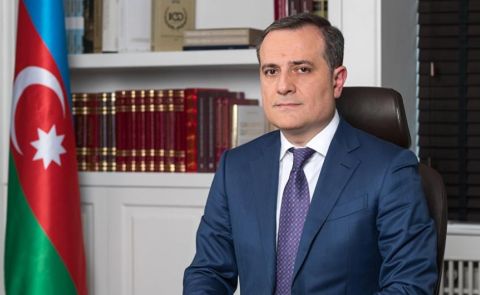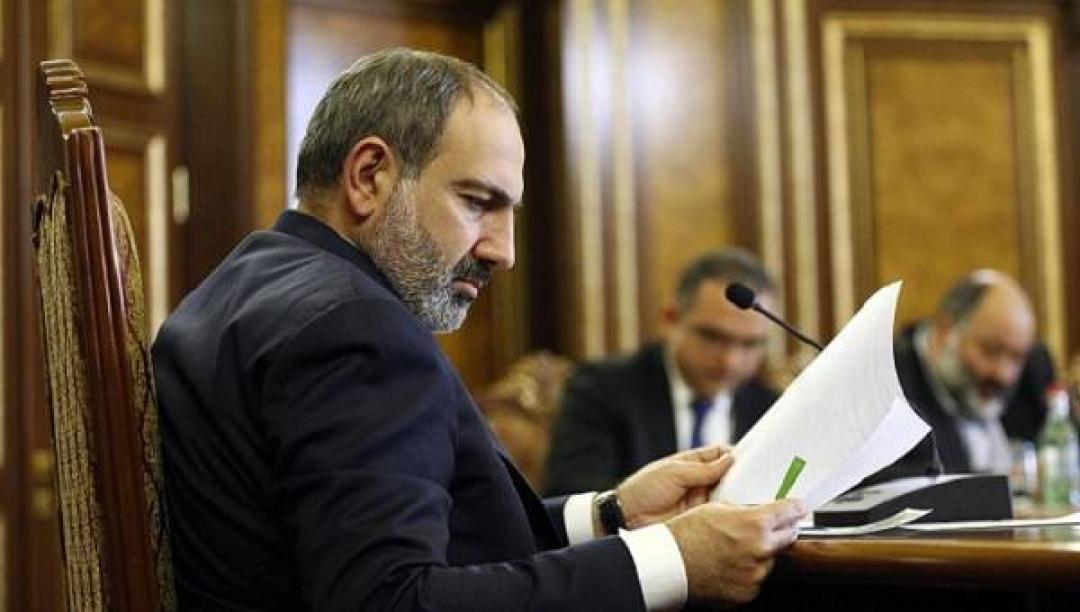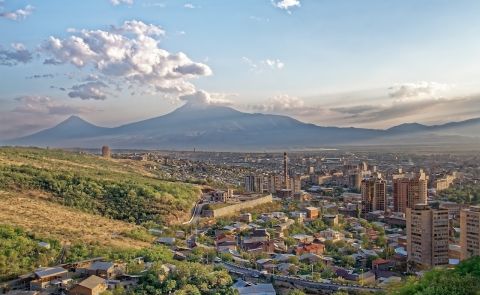
Kocharyan free, Pashinyan furious: The situation in Armenia is tense

On 20 May, Prime Minister Nikol Pashinyan has called on his supporters to block courthouses in Armenia.
The appeal to block the courthouses came after the decision of the court in Yerevan to release the former President of Armenia, Robert Kocharyan, on pre-trial. Davit Grigorian, the judge who was presiding over the trial, issued his judgement after the pledge of Bako Sahakyan and Arkadi Ghukasyan (former and present president of the internationally unacknowledged Republic of Nagorno-Karabakh) to guarantee Kocharyan’s “appropriate behavior” in case of his release.
While commenting earlier on the court's decision to release Kocharyan, Pashinyan stated that "the second and most important phase of the revolution is ripening in the country", the TASS reported on May 19. On the same day, Pashinyan posted on facebook a call to block all courthouses (in Armenia). "On May 20, beginning at 8:30 a.m., we will block all the entrances and exits to and from all the courthouses without exception, so that no one could exit", reads his post. The protesters followed Pashinyan’s instructions and blocked the entrances to courthouses across Armenia. The president himself took part in the blockade, even though Pashinyan declared earlier that he does not intend to participate. During his visit he hailed several dozen protesters which blocked one of the courthouses in Yerevan. “I hope you don’t catch a cold”, he said. “I’ve come to say that I love you”, he added.
On the same day, he called an emergency meeting with senior state officials, where he demanded a mandatory “vetting” of all judges in Armenia and said that many of them must resign because of their connections to the country’s former leadership and due to the mistrust of the public. “The people of Armenia perceive the judicial authority as a remnant of the former corrupt system in which plots against the people are constantly hatched and executed […]The public must have full information about the judges’ political ties, origins, property status and activities as judges and in their previous capacity, and their individual and professional traits […] The judges whose decisions have led to rulings against Armenia handed down by the European Court of Human Rights (ECHR) must resign, leave or be sacked”, said Pashinyan on television after the meeting.
Pashinyan also spoke out against him about an alleged plot by the "old corrupt elites". These forces would try to drive a wedge between the Armenians in Armenia and those in Nagorno-Karabakh in order to cover up or justify their own corruption. The Armenian prime minister suggested that the old elites are planning a war that would lead to territorial losses, and that responsibility would be attributed to the government. Such activities are equal to treason, and as Commander-in-Chief of Armenia, he would act against it tough and decisively, announced Pashinyan. In addition, Pashinyan demanded to set up a parliamentary commission to investigate all circumstances of the fighting between Armenia and Azerbaijan in April 2016, which has also been called “four-day war”.
It was not a coincidence that on May 19, the car of Vitaliy Balasanyan, chairman of the Nagorno-Karabakh Security Council, was stopped by the police at the entrance to Yerevan and searched for illegal weapons. Balasanyan promised not to leave this action unanswered. The relations between Nikol Pashinyan and Vitaliy Balasanyan are considered very tense. In general, the military-political elite of the Nagorno-Karabakh-Armenians is increasingly disgraced by the Armenian prime minister. The support from Nagorno-Karabakh for Robert Kocharyan, the archenemy of Pashinyan, was the trigger here. On May 10, the Armenian prime minister warned his political opponents against "turning Nagorno-Karabakh into a nest of counter-revolutionaries". Otherwise it would come to a revolution in Nagorno-Karabakh itself. On May 20, Pashinyan openly called on the Nagorno-Karabakh Armenians to stand behind the people and the government of Armenia and to reject the "other forces" in Nagorno-Karabakh.
On 20 May, two hours after his speech, Pashinyan recalled the protests through a facebook post. “Today’s action served its purpose. The process of establishing an independent judicial system in Armenia has launched and it has become inevitable”, the post reads.
Pashinyan’s rash move against the judicial system of Armenia caused negative reactions on both the domestic and international level.
The ruling “My Step” faction denies that the protest call of Pashinyan had anything to do with the court’s decision to release Kocharyan. The faction’s leader, Lilit Makunts, said that Pashinyan’s decision only “coincided” with the court’s ruling.
The representatives of Prosperous Armenia (BHK) criticized Pashinyan’s move as an attempt to overthrow the constitutional order of Armenia. Gevorg Petrosian from the BHK fears that this move could lead to a “civil war” in Armenia. The party publicly demanded that the government shall not take any “unconstitutional actions”.
Bright Armenia (LHK), the other opposition party represented in the parliament, accused Pashinyan of disrupting “the administration of bringing justice for thousands of people” and thus of violating their constitutional rights as well as Armenia’s international obligations. The LHK representatives called on Pashinyan to reconsider his decision and appealed to the government to call an emergency session of the National Assembly, expressing readiness to participate in the “institutional reformation of the judicial system.”
The members of the former ruling Republican Party of Armenia (HHK) put out the accusation that the “unprecedented pressure” on the Armenian judiciary violates not only the constitution but also the Criminal Code of the country. They warned the Armenian citizens to steer clear of the “dangerous and adventuristic procedures” initiated by Pashinyan.
The president of Armenia, Armen Sarkissian, issued a statement on 19 May, calling on all citizens, regardless of their public and political position and office, to maintain peace and calmness, and to respect the constitution and laws. “The fact that the democratic processes in Armenia are irreversible should not be doubted in Armenia or abroad. Under the constitution of the Republic of Armenia, all power belongs to people. Consequently, branches of the Armenian government - legislative, executive and judicial – must reflect the collective will of the people of Armenia and serve their constitutional goals”, president Sarkissian said in a statement.
The country’s Ombudsmann, Arman Tatoyan, condemned Pashinyan’s decision to be very dangerous for the security and stability of the justice system in Armenia. “Any interference into the activities of the courts and the implementation of justice is prohibited. The requirement of effective judicial power in the country is the full independence of the court and the judges, both from the legislative and the executive branches, from any other body or from the official himself”, reads the statement of the Ombudsman.
The director for Special Research at Freedom House, Nate Schenkkan, classified Pashinyan as a “populist” after his move to block the courts. The danger in post-revolutionary Armenia was always that Pashinyan, lacking the ability to transform the country quickly or sustainably, would fall back to the populism that got him into power. [And] here we are”, stood in Schenkkan’s twitter post.
The US embassy in Armenia also stressed their worries in regards to the recent developments. “The United States is committed to working with the Armenians to support the strengthening of an independent judiciary, which includes anti-corruption efforts and the development of rule of law institutions. This requires determination, vigilance and a long-term strategy to build transparent and accountable government institutions. The Armenian people have made it clear that they support these changes, and we encourage the government to pursue judicial reform in a manner commensurate with the Armenian constitution”, reads the official statement of the embassy.
Grant Mikaelyan, a political analyst, is of the opinion that such actions can lead to the liquidation of the independent judiciary in Armenia. A similar view is shared by the journalist Armen Gasparyan, saying that the blocking of courts demonstrates the fact that there will be no legitimate order in Armenia under the new government. "The main problems of modern Ukraine have begun when they started to destroy justice, and in the absence of a regulated, normal legal system, Ukrainian corruption increased by 4.5 times compared to the Yanukovich era. I am afraid that if Mr. Pashinyan moves along this road, he will quickly erase his achievements of the past six months and will plunge the country into a very difficult internal political situation, because every succeeding politician, looking at Pashinyan's actions, will think that he also can act like that”, said Gasparyan.
See Also


Nordic-Baltic Delegation Meets Armenian Leaders to Discuss Regional Cooperation and Peace

Azerbaijan Strengthens Energy Partnerships with Multiple Countries

BP Strengthens Presence in Azerbaijan’s Offshore Energy Sector

Netanyahu’s Letter to Aliyev: Mutual Trust, Solidarity Following Hamas Attacks, Facilitating Dialogue Between Israel and Türkiye

